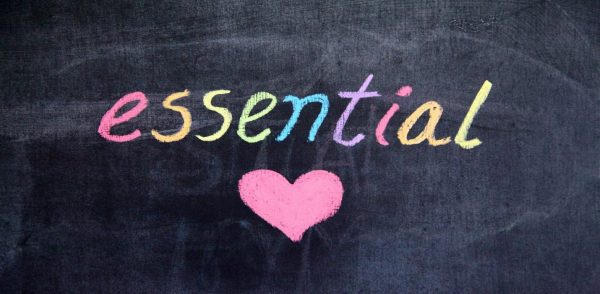5 Ways to Develop & Practice It
| Written by Gabrielle J. Davis, MSHS, MSMHC, LPC, NCC

Do you ever stop to think or question why you show support or try to do everything in your power to help a loved one? Probably not for a variety of reasons such as, ‘it’s the right thing to do’, or ‘I’d want someone to do the same for me’, or simply ‘it’s human nature.’
When we’re in need, we can all appreciate and welcome someone else’s consideration, love, acceptance, forgiveness, and kindness as it just generally feels good. What if you directed that same consideration and compassion toward yourself? What would that look like? How would that feel to you?
Having kindness for oneself is just as important as giving it or receiving it from others. This concept is not foreign but might seem that way when we don’t try to practice or implement it in our daily lives. This concept is more commonly referred to as self-compassion.
Let’s define self-compassion, and then explore 5 ways you can begin to develop and practice it. Self-compassion essentially means giving yourself grace as well as relating to yourself in a more positive and constructive way through 3 key factors: 1) Self-kindness, 2) Common Humanity, and 3) Mindfulness.
Self-kindness is simply that – being kind to yourself even when you don’t believe you deserve or feel worthy of it. Self-kindness allows you to embrace imperfection rather than beating yourself up when you make a mistake or judging yourself too harshly when things don’t go as hoped. For example, you studied for a test for weeks and even got some tutoring but didn’t get the score you wanted and now you believe you’re ‘stupid’ or that all your hard work was a ‘waste of time.’
Pause for a moment to think about what you would say to a friend or family member. Would you say something hurtful or unkind to further valid the negative talk?
Most likely you would say something encouraging, kind, loving, or even funny to make light of it in a supportive way. So, let’s show that same kindness to yourself!
Common Humanity is understanding that you are part of a bigger picture called human experience, and as individuals, we share relatable experiences that allow us to connect with others. We all undergo things that someone else can recognize whether directly or indirectly through another person or perhaps learned about due to a current event, or even social media.
Our humanness serves as a reminder of just how important compassion is for everyone, that includes extending it to ourselves. In the words of the Dali Lama, “Love and compassion are necessities, not luxuries. Without them, humanity could not survive.”

Mindfulness is being presently aware of negative or hurtful thoughts and feelings but to counter them by not over identifying with them causing self-judgment.
To illustrate, you had an extremely stressful day at work along with other competing life demands that require your attention. Your tween daughter is having an emotional ‘meltdown’ about her new haircut because of a comment made by a kid at school and now she blames and verbally attacks you for it. Suddenly, you snap back saying, “there are more important things to be upset about, get over it.” Moments after, you are angry at yourself for losing your temper. You are feeling terrible about what you said and start thinking you are the worst parent in the world.
To counter this negativity and self-judgment, take a moment to recognize the event that just happened (yelling at your daughter) that triggered the negative thought (you’re the worst parent in the world) and the consequence or self-judgment (feeling terrible and angry at yourself) overall.
To refute the negative/self-judgment, first take a few slow deep breaths. Then, provide yourself with a rational counter statement such as this one, “I had a very stressful day, and my frustration got the best of me. My daughter doesn’t normally see me react this way. She knows how much I love her, and I will apologize to her for my behavior.”
Continue to replace any negative thoughts with rational positive counter thoughts. Be mindful of the situation that activated the hurtful thoughts and feelings in the moment, not you as a person. In addition, reflect on the evidence and your positive qualities that confirms you are a great parent and person overall.
5 Ways to Develop and Practice Self-Compassion:
1. Allowing yourself to be ‘perfectly imperfect.’
Yes, it’s true no one is perfect! This concept reminds us that we are all ‘wonderful works in progress’ learning from our mistakes and experiences. Embracing this concept also grants you the freedom to be every version of yourself that includes life moments of success and failure. In the words of Winston Churchill, “Success is not final, failure is not fatal: it is the courage to continue that counts.” So, continue to live, love, and laugh with flaws and all!

2. Identifying your personal strengths and positive traits.
We all have them even if you don’t think you do. Think about a day, time, or a situation where you were able to make someone laugh, or took the lead on a task, or didn’t give up easily on something, or even adjusted your routine. These are all aspects of your strengths and qualities.
Take a moment and create a word list of your different qualities and strengths. You can start by thinking of words that you’ve heard others use to describe you based on your interactions with them from various settings such as school, work, home, social and community events. For instance, pleasant, loving, flexible, open-minded, creative, intelligent, determined, funny, etc. Now, reflect on your word list each day to begin practicing these qualities toward yourself the way you would do naturally toward others.
3. Connecting with your inner self through positive and self-affirmations.
Yes, it’s wonderful to get external validation, praise, and compliments from others as it helps to boost one’s self-confidence and self-esteem. It is also something that we can’t always expect to receive or rely on whenever we want. However, you can expect and count on it from yourself no matter the hour, day, or season!

4. Reflecting on life experiences (positive or negative) as personal growth opportunities.
Remind and repeat to yourself everyday about your progress no matter how big or small. Consider the positive changes that you’re making or the different steps toward a goal that you have completed. Use positive self-talk to encourage yourself the same way you would a family member, friend, or co-worker.
5. Reminding yourself that it’s okay to consider your needs and wants ahead of others at times.
This notion allows you to be in a better position [mentally, emotionally, physically] to show compassion and support. It’s like the classic airplane oxygen mask analogy, where you’re instructed prior to take off to put your mask on first so that you can help others.
A great way to achieve this is by implementing self-care practices. Self-care goes beyond getting an occasional mani-pedi or massage. It’s something that you consistently incorporate in your life to help you to function best. Self-care can be a daily, weekly, monthly, or any time frame that you set. It can include things like journaling, reading, saying ‘no,’ going for a bike ride or long walk, meditating, relaxing in a bathtub, hanging out with friends, getting restful sleep, praying, taking a break from electronic devices or social media. Whatever you choose, let it be something that brings you a sense of calm, joy, and nurtures a positive self-regard.
If you (or a loved one) are experiencing challenges with being kind, forgiving, and loving toward yourself, don’t hesitate to reach out for help. A licensed mental health professional can guide you through the process of developing and practicing self-compassion to live a more balanced, healthier, and happier life.
Gabrielle incorporates a strength-based/positive psychology, wellness approach in her work that allows treatment to be dynamic and based on client needs and goals.
Gabrielle enjoys being with her family, spending time with friends, cooking “Sunday” dinners, being out in nature, riding her motorcycle, and watching various professional sporting events on TV or in-person.
“Be yourself; everyone else is already taken.” – Oscar Wilde
EWC has locations in Manalapan and Shrewsbury, NJ, and accepts a variety of insurances.
Check out Gabrielle’s’s professional bio here.
Email Us: info@exceptionalwellnesscounseling.com
Call Now: (908) 415-2042
NEXT STEPS & RESOURCES
-
- Are you ready to take your first step? Reach out to us.
- Do you feel you may benefit from counseling during this time? Take the first step.
- Interested in online counseling? Learn more.
- Interested in group counseling? Learn more

